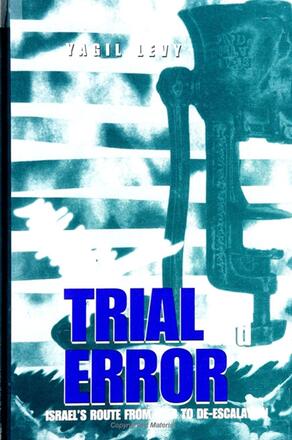
Trial and Error
Israel's Route from War to De-Escalation
Alternative formats available from:
Questions the commonly accepted view that Israel's military policies were formed in direct response to Arab states' hostility and argues for a historical linkage between Israel's changing military posture and the development of an inequitable Israeli social structure.
Description
Trial and Error offers a unique exploration of the link between Israel's military policies and its ethno-class relations of power that has theoretical implications elsewhere. The book denounces the commonly accepted view that Israel's military policies were crafted merely as a direct and inevitable response to neighboring Arab states' hostility. Instead, Yagil Levy shows that Israel's security interests were also determined by the social interests of a rising middle class comprised of Jews of European descent. Because of the protracted state of war, this class achieved dominant status over other groups. As a result, a strong link was created between increasing inegalitarianism in Israeli society and missed opportunities to adopt more moderate foreign policies at crucial crossroads up to the 1980s. Paradoxically, however, as war benefits elevated the consumerist lifestyle of the middle class, the burden of war became less appealing to it. Levy argues that this and other social constraints, along with limitations imposed by the international system, played a focal role in channeling Israel's policies toward the 1990s' peace process.
Yagil Levy is a Visiting Research Fellow at the Center for Studies of Social Change at the New School for Social Research, New York.
Reviews
"By providing an interesting linkage between Israel's foreign policy behavior and alterations and changes in Israeli domestic politics, Levy is offering a provocative thesis that deserves wide readership. I have no doubt that some readers will applaud Levy's courage and thesis, and that others will do just the opposite. No one, however, will walk away feeling indifferent." — Michael Barnett, editor of Israel in Comparative Perspective: Challenging the Conventional Wisdom
"An important and valuable contribution to the understanding of Israel's domestic, security, and foreign policies and the close relations among them. From this perspective, Levy's book is not only an important, but also an innovative and serious, addition to the recent growth in the 'revision' of traditional mainstream historical and social-science writings about Israel." — Baruch Kimmerling, editor of The Israeli State and Society: Boundaries and Frontiers
"Breaking open the black boxes of international and domestic politics, identifying unsuspected mechanisms within them and unsuspected connections between them, Yagil Levy provides a fresh view of political processes in Israel and elsewhere....His work will stimulate new efforts at integrating studies of inequality, of international interactions, and of how state policy emerges from error-filled and error-correcting political action." — Charles Tilly, Joseph L. Buttenwieser Professor of Social Science, Columbia University